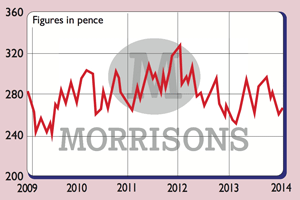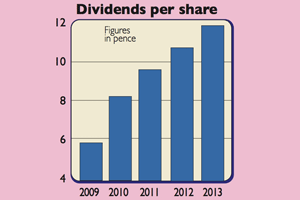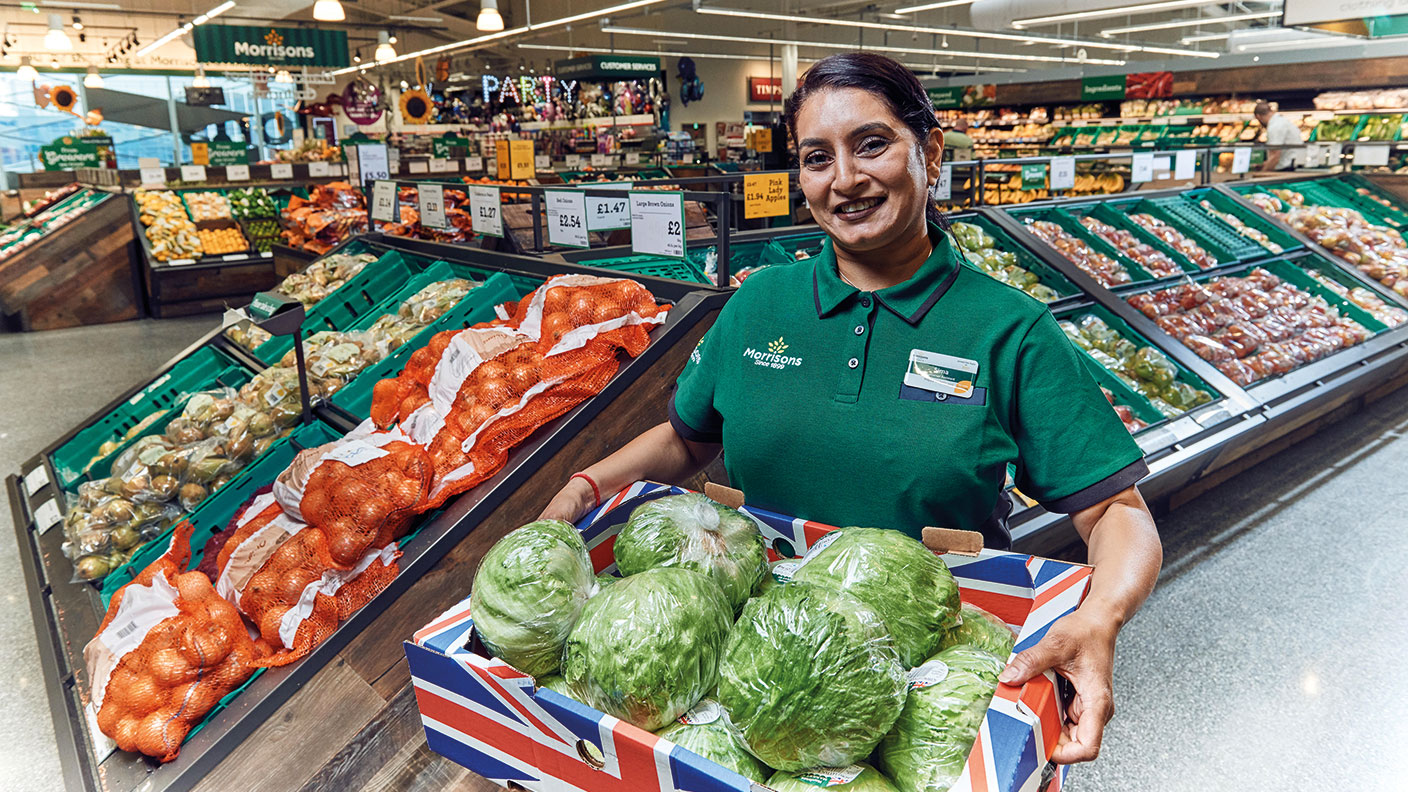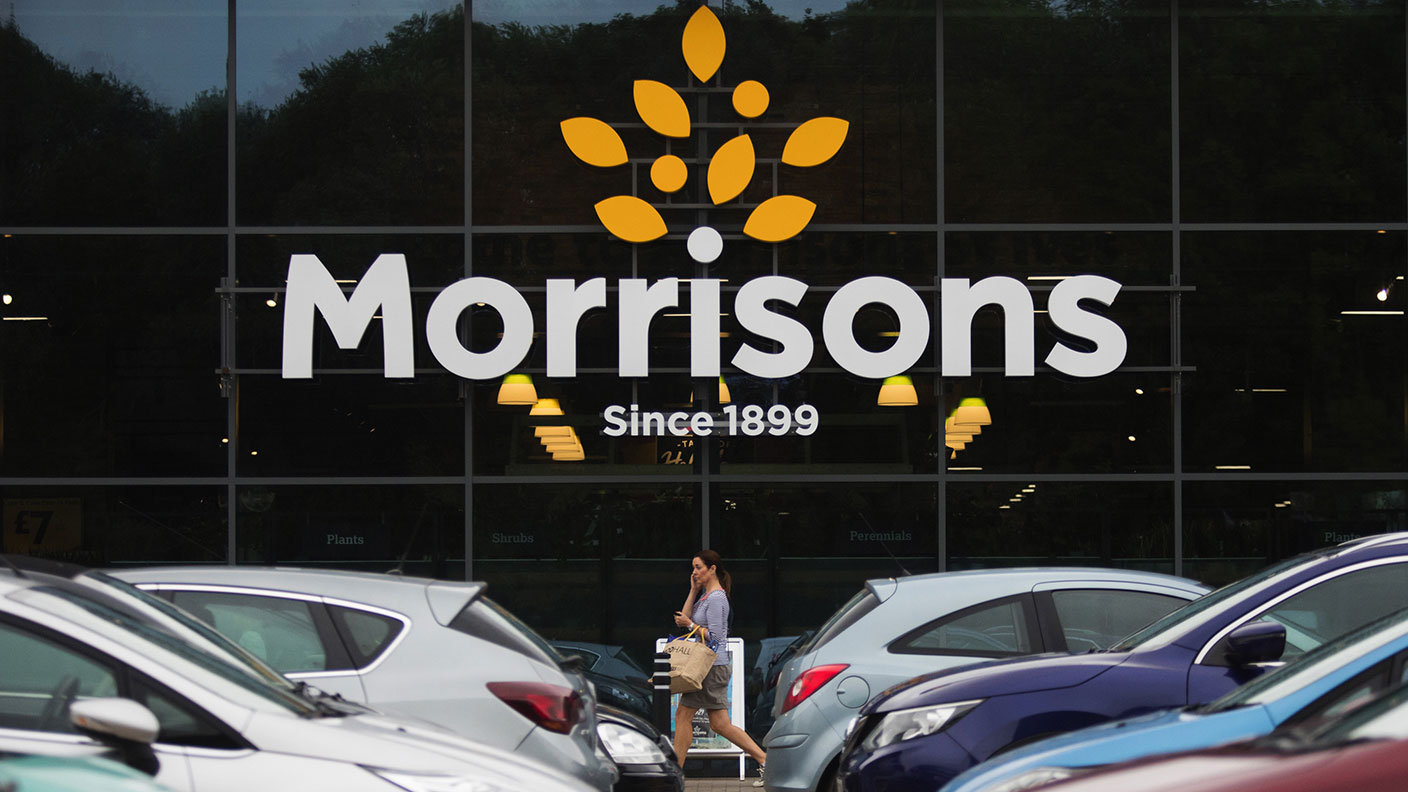Shares in focus: Should you back Morrisons?
It’s a supermarket laggard, but could lame duck Morrisons reward patient investors? Phil Oakley investigates.
Get the latest financial news, insights and expert analysis from our award-winning MoneyWeek team, to help you understand what really matters when it comes to your finances.
You are now subscribed
Your newsletter sign-up was successful
Want to add more newsletters?

Twice daily
MoneyWeek
Get the latest financial news, insights and expert analysis from our award-winning MoneyWeek team, to help you understand what really matters when it comes to your finances.

Four times a week
Look After My Bills
Sign up to our free money-saving newsletter, filled with the latest news and expert advice to help you find the best tips and deals for managing your bills. Start saving today!
It's a supermarket laggard, but Morrisons may reward patient investors, says Phil Oakley.
The Morrisons of today started out as an eggs and butter stall in a Bradford market in 1899. From those humble beginnings it went on to become one of the most effective food retailers in Britain.
Its focus on cutting out the middleman and making a lot of its own food to sell meant that it could offer good-quality food at very good prices. It became a big hit with customers in the north of England, while delivering spectacular returns for its shareholders.
MoneyWeek
Subscribe to MoneyWeek today and get your first six magazine issues absolutely FREE

Sign up to Money Morning
Don't miss the latest investment and personal finances news, market analysis, plus money-saving tips with our free twice-daily newsletter
Don't miss the latest investment and personal finances news, market analysis, plus money-saving tips with our free twice-daily newsletter
By the early 2000s it was running short of land to expand its business, particularly in the south of England where it needed more stores. So in 2004 it bought rival supermarket chain Safeway, which had been struggling for years.
Safeway's big problem was that it charged high prices and couldn't attract enough shoppers. Morrisons thought that it could quickly fix this by converting the Safeway stores and cutting prices. It wasn't that simple.
Customers gave the new stores a lukewarm response and profits tanked. It took a new management team and five years of work to put things right again.
However, by 2008 Morrisons was back on track and doing well. Despite the recession in Britain, it was gaining market share and growing its profits nicely. Its focus on providing fresh food at competitive prices was going down well across the country. The future looked bright.
Stuck in no-man's-land
But the last three years have been very disappointing. Morrisons seems to have lost its way. Customers don't really know what it stands for anymore. It seems to be stuck in no-man's-land between the quality players, such as Waitrose, and discounters, such as Aldi and Lidl. It has also been slow to adapt to changes in people's shopping habits.
More and more of us are doing our weekly grocery shop online and also using convenience stores for top-up' shops. Morrisons' failure to invest here has seen it lose customers. It is now playing a desperate game of catch-up.
Both its profits and its share price have been going down, and sentiment towards the company is very poor right now. So is Morrisons a helpless basket case or a turnaround story in waiting that could reward patient investors?
Is a recovery on the cards?
Most City analysts who generally look on the bright side are lukewarm on Morrisons. Very few recommend buying its shares, while many even say sell. And its poor performance makes the case for selling very compelling. However, history shows that when lots of analysts think alike, it can be profitable to take the opposite view. You just have to be patient.
Trading is unlikely to improve quickly. It's reasonable to assume that Morrisons continued to struggle over Christmas, but the company is coming up against very weak sales comparisons from last year and there is some hope that the business could stabilise.
The management is also cutting costs and focusing on getting more cash flow from the business. This should underpin profits and dividends over the next couple of years.
Of course, a genuine recovery would mean making more sales. On that front Morrisons will soon have 100 convenience stores open and will look to add another 100 in 2014. Over half will be in London and the southeast, where it is under-represented. This should give it a good chance of boosting sales and profits without taking business from bigger Morrisons stores nearby.
It will soon start selling food online in partnership with online delivery group Ocado, but this will take some time to pay off if it pays off at all. Morrisons will not be able to deliver to the whole country for a while, which could hold it back. More importantly, food retailers have not yet demonstrated that delivering groceries ordered online is a good way to make money.
Should you buy the shares?
So investors hoping for a turnaround will be focusing on the company's sales and profits performance in the months ahead. However, what may be of more interest to smart investors is the quality of Morrisons' assets. I can't help feeling that time may be running out for the current management team to get things right.
Just as happened with Safeway a decade ago, Morrisons has become the lame duck of the supermarket sector. It may be worth more to someone else than it is continuing on its own.
With that in mind, Morrisons reckons that its property portfolio has a market value of around £9bn. At the current share price of 257p, the market value of the whole business (all its shares and its borrowings) is £8.7bn. Of its stores, 90% are freehold, which suggests that Morrisons could be an interesting property play if some of its rivals wanted to break it up. There would surely be no shortage of interested parties.
Marks & Spencer, Waitrose, Aldi and Lidl all want to grow their food businesses, while Asda and Sainsbury's may also be interested in picking up some stores. Buying Morrisons and sharing it out between them could make a lot of sense and would probably avoid any referral to the competition authorities.
In the meantime, Morrisons may turn itself around it's happened before. It is very unlikely to go out of business interest payments are covered ten times by profits and it is paying a relatively secure dividend, giving a prospective yield of 5%.
So, while buying Morrisons now flies in the face of consensus opinion, contrarian investments can pay off handsomely. With a decent dividend income and a property-backed share price it might just be worthwhile going against the crowd and buying a few now.
Verdict: buy as a property play

Morrisons (LSE: MRW)Share price: 257pMarket cap: £6.0bnNet assets (August 2013): £5.3bnNet debt (November 2013): £2.7bnP/e (prospective): 10.4 timesYield (prospective): 5%Dividend cover: 1.9 timesInterest cover: ten times

What the analysts sayBuy: 3Hold: 11Sell: 12Target price: 263p
Directors' shareholdings
D Philips (CEO): 246,119T Strain (CFO): 0I Gibson (chair): 108,055
Get the latest financial news, insights and expert analysis from our award-winning MoneyWeek team, to help you understand what really matters when it comes to your finances.
Phil spent 13 years as an investment analyst for both stockbroking and fund management companies.
-
 How a ‘great view’ from your home can boost its value by 35%
How a ‘great view’ from your home can boost its value by 35%A house that comes with a picturesque backdrop could add tens of thousands of pounds to its asking price – but how does each region compare?
-
 What is a care fees annuity and how much does it cost?
What is a care fees annuity and how much does it cost?How we will be cared for in our later years – and how much we are willing to pay for it – are conversations best had as early as possible. One option to cover the cost is a care fees annuity. We look at the pros and cons.
-
 Morrisons takeover bid: supermarket is an attractive target for private-equity buyers
Morrisons takeover bid: supermarket is an attractive target for private-equity buyersNews A private-equity group has made an offer for Morrisons, Britain’s fourth-largest supermarket. Other bids are likely to emerge. Matthew Partridge reports.
-
 Morrisons is just the start – get ready for a private equity feeding frenzy
Morrisons is just the start – get ready for a private equity feeding frenzyAnalysis The bid to buy the Morrisons supermarket chain is the latest example of UK listed companies being snapped up by private equity groups. It won’t be the last, says John Stepek – we could well see a feeding frenzy before this is all over.
-
 Morrisons back from the brink
Morrisons back from the brinkFeatures The supermarket chain has made a strong recovery from a near-death experience. How did CEO David Potts do it? Alice Gråhns reports.
-
 Amazon chews up the grocery market
Amazon chews up the grocery marketFeatures If you hold supermarket shares, watch out, says Alex Williams. Amazon plans to shake up the grocery sector.
-
 Glimmers of hope for Morrisons
Glimmers of hope for MorrisonsNews Supermarket Morrisons enjoyed better-than-expected sales over Christmas.
-
The ten most-hated shares in the FTSE
Features These are London’s ten most-hated shares, judged by the percentage of stock being shorted.
-
Shares in focus: How our tips have fared this year
Features It's been a tough year for stocks. Phil Oakley looks back over the share tips he made in 2014 to see how they have fared, and what investors should do next.
-
It’s time for an orderly retreat in the supermarket wars
Features The big four supermarkets could spend billions taking on the discounters. But the City should not allow them to, says Matthew Lynn.